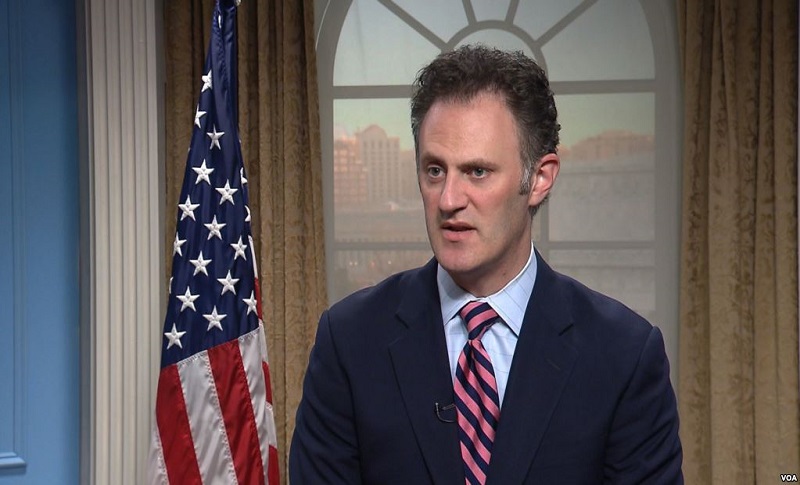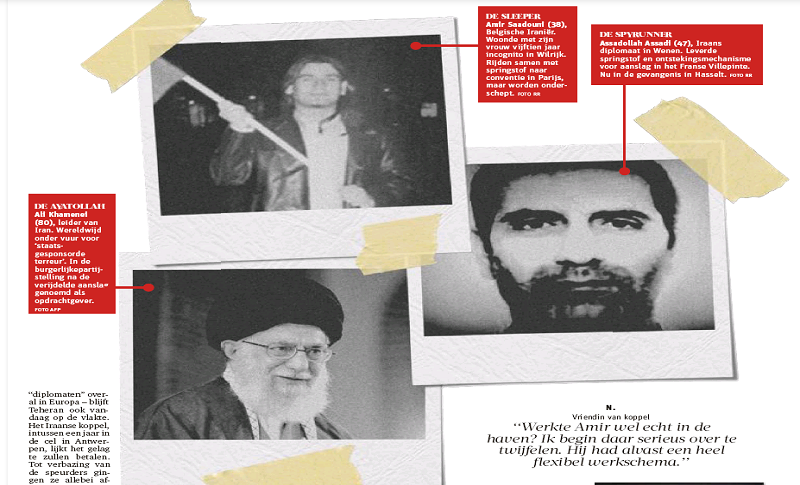

By Azita Carlson
The U.S. State Department Country Reports on Terrorism 2018, released on November 1, 2019, once again called Iran the “world’s worst state sponsor of terrorism.” The report mentioned the foiled attack on the annual meeting of supporters of the main Iranian opposition group Mujahedin-e-Khalq (PMOI or MEK)in Villepinte, near Paris on June 30, 2018.
“In 2018, the Iranian government continued this pattern of behavior, supporting terrorist plots to attack Iranian dissidents in several countries in continental Europe. In June 2018, the Netherlands expelled two Iranian diplomats associated with the November 2017 assassination of an Iranian diplomat on Dutch soil. In October 2018, Belgian authorities arrested an Iranian diplomat and two Belgian citizens of Iranian heritage for plotting to bomb an Iranian opposition group rally that occurred in June 2018 outside Paris. In October 2018, Denmark recalled its ambassador from Tehran and condemned an Iran-backed plot to assassinate an Iranian dissident in Denmark. Finally, in December 2018, the Albanian government expelled Iranian diplomats in retaliation for Iran-sponsored attempts to conduct terrorist attacks in Albania,” mentioned the report.
On October 28, 2019, in an article written by Pieter Huyberechts in GVA on Monday, October 28, 2019, mentioned the direct role of the Iranian regime’s Ministry of Intelligence (MOIS) in the plot.
According to the newspaper, Amir Saadouni (38) and his wife Nasimeh Naami (33) went to Iran many years ago and were recruited by the regime’s intelligence ministry. They were arrested in Sint-Pieters-Woluwe, 30 minutes after they left their home in Wilrijk to Paris. “Their goal was clear: exploding a bomb at an event with thousands of people and creating chaos as much as they could,” said an informed source.

Background & Facts
Asadollah Assadi, head of the mullahs’ intelligence at the Iranian regime’s embassy in Vienna and the liaison of terrorists in Germany is among those arrested.
According to a joint statement by the Belgian federal prosecutor and the federal intelligence and security agency, a terrorist couple affiliated with the Iranian regime who were commissioned to commit a terrorist attack against the grand gathering of the Iranian Resistance in Paris on June 30, 2018, were arrested in Belgium, and the judge issued an arrest warrant against them.
According to the statement, they were found carrying about 500 grams of TATP material and a detonator in a women’s makeup briefcase. According to this statement, a person suspected of complicity with the two aforementioned individuals was simultaneously arrested in France. The statement adds that an Iranian diplomat from the Iranian regime’s embassy in Vienna, who was the liaison with the arrested terrorists, was also arrested in Germany.
1. The couple who were arrested in a Mercedes-Benz in the city of Antwerp, Belgium, was Amir Sadouni (38) and Nasim Naami (34), who pretended to be supporters of the (PMOI/MEK). They had Belgian citizenship.
Amir Sadouni worked in a shipping company operating between the Netherlands and Belgium and secretly traveled to Iran. Nasim Naami went to Belgium from Iran in 2009 and married Sadouni.
2. The diplomat-terrorist arrested in Germany is Asadollah Assadi (47), who has been the head of the Iranian regime’s intelligence station at the regime’s embassy in Vienna since 2014. He had given the final order to the terrorists to attack the June 30th gathering. Asadollah Assadi had replaced the regime’s other diplomat-terrorist by the name of Mostafa Roudaki. Mostafa Roudaki went to Tehran from Austria and was dispatched to Albania in 2017 as the first secretary of the embassy in order to pursue espionage and terrorist activities against the (PMOI/MEK). In order to facilitate Roudaki’s activities, the Habilian Center and Dideban Association, two branches of the Ministry of Intelligence (MOIS), became active in Albania under the guise of cultural and press activities.
3. The person who has been arrested in France on suspicion of complicity with the terrorists is Mehrdad Arefani (55 years old). His wife, who has separated from him, was linked to an intelligence officer in Iran.
4. The Belgian police have inspected five other places in different parts of Belgium, but the results have not been disclosed yet due to security reasons.
The demands of the Iranian people and Resistance
Iranian Resistance had repeatedly warned of the terrorist preparations by the mullahs’ diplomats and the mercenaries of the Ministry of Intelligence (MOIS) and the IRGC Qods Force in various European countries including Belgium.
The European intelligence organizations, in their annual reports, have consistently emphasized that the (PMOI/MEK) and the National Council of Resistance of Iran are the main targets of the Ministry of Intelligence and the terrorist Quds Force. Following the regime’s terrorist attacks in Europe, the European Union on April 29, 1997, ordered the mullahs’ mercenaries and intelligence and security agents to be expelled from the Member States and not allowed to enter any of these countries.
In this regard, the Iranian Resistance called for the closure of the embassies and agencies of the mullahs’ regime, the centers of terrorism and espionage, and the expulsion of diplomats and agents of intelligence and terrorist Quds Force from European countries, and emphasized the need to disclose and publish all details of the case. Public opinion must be fully informed about the regime’s terrorist plots. This is necessary to ensure the security of Iranian refugees and dissidents.







